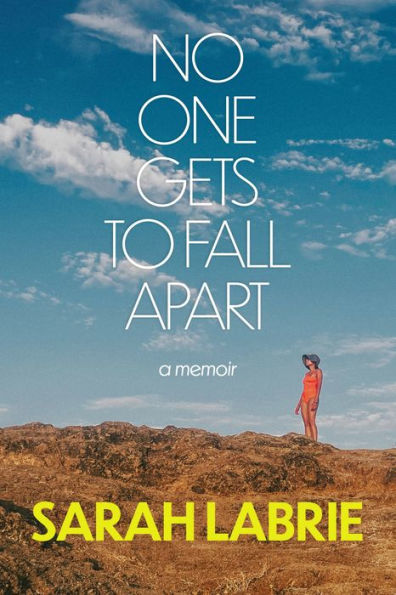A New York Times "Editor's Pick" * An Essence "Most Anticipated" * A Lit Hub's "Most Anticipated" * An Oprah Daily "Best Book of Fall" * An Esquire "Best Memoir of the Year" * A San Francisco Chronicle "New Book for a Season of Change" * A Zibby Owens "Most Anticipated" * A Platform Mag "Debut Novel to Read" —
"I had a compulsive relationship with No One Gets to Fall Apart. Once I opened this brilliant memoir, I needed to finish it. When I wasn't reading, I was thinking about Sarah LaBrie's story, turning over in my mind her most devastating observations about motherhood, madness, and creativity. This book is stunning, one of the best memoirs I've read in a decade. No One Gets to Fall Apart deserves a place alongside modern classics like Jeannette Walls' The Glass Castle and Tara Westover's Educated." — Susannah Cahalan, New York Times bestselling author of Brain on Fire and The Great Pretender
"This is a brilliant memoir about what we inherit and what we create; what disappears and what remains. Full of intelligence and rueful humor, No One Gets to Fall Apart is a triumph of every kind of literary perseverance." — Lorrie Moore, author of I Am Homeless If This Is Not My Home
“Urgent and imaginative… No One Gets to Fall Apart makes for an engrossing read, its hectic scenes held together by a psychically unmoored narrator whose wit and honesty make us trust her anyway.”
— New York Times Book Review
"No One Gets to Fall Apart is a sensitive and courageous debut by a talented writer seeking a deeper understanding of herself and her past." — Nicole Chung, for Esquire
“Across this haunting, harrowing and at times rollicking account, [Sarah LaBrie] is forced in turn to frame a part, a role, a life amidst chaos. And she does so with a grace and a thoughtfulness worthy of her hero Walter Benjamin.” — Lawrence Weschler, author of Mr. Wilson's Cabinet of Wonder
"[A] spellbinding debut.... With unflinching honesty (‘I am so terribly sick of cannibalizing my life for art’) and lyrical prose, LaBrie elegantly captures the grunt work of self-acceptance.” — Publishers Weekly
“LaBrie's spellbinding prose is a metaphysical experience: cinematic, poetic, philosophical, and wholly stunning. If psychiatric disability has impacted your life, or if you've ever been lonely, or if you enjoy having exceptional writing light up your brain, this book is an essential gift. It's that rare gem that somehow holds dazzling intertextual craft and prodigiously tender honesty in equal turn, to sublime effect. This memoir will never leave me.” — Alissa Nutting, author of Made for Love and Tampa
"[An] unforgettable memoir… Deeply intelligent and unashamedly real.” — Oprah Daily
“Extraordinary… LaBrie brings a piercing astuteness and sensitive voice to the dilemma raised by the writer’s desire to tell a story.”
— Los Angeles Times
“Introspective and vulnerable… The willingness to nakedly share this healing and her struggles are exactly what make the book so alluring, and [LaBrie’s] utter honesty is the strongest part of her work.”
— Pittsburgh Post-Gazette
"Readers will be treated to a meandering and wise discussion of the past’s coloring of our futures, and how to carve the best path forward even through pain and rupture." — Literary Hub
"LaBrie’s intimate and vivid chronicle is haunting in its sorrow and beautiful in its daring and hope.” — Booklist
“A memoir that faces failure head-on....[LaBrie] does a remarkable job presenting the ways in which our health care system has failed the women in her family...A bracing look at a writer’s troubled past.” — Kirkus Reviews
"This memoir was an eye-opening account of mental illness and family dynamics. LaBrie allows readers into deeply personal moments while shedding light on more widespread themes that stem from her family’s past as well as LaBrie’s own creative drive." — Debutiful, "10 noteworthy debut books"
“With remarkable insight and frankness, TV writer and librettist Sarah LaBrie mines her family history of mental illness in her ambitious debut memoir… No One Gets to Fall Apart examines family dynamics, mental health, Blackness, literature, friendship, the #MeToo movement and more as LaBrie illustrates her desire to embrace her own emotions, even as the temptation to suppress them looms.” — BookPage
2024-09-14
A memoir that faces failure head-on.
In Labrie’s raw account, there is the failure of her mother to parent her daughter without resorting to abuse. There is also her grandmother’s refusal to seek medical help for her daughter’s escalating mental health crisis. And LaBrie tells of battling her own mental health issues, making clear the danger she faced in having to parent herself. The author does a remarkable job presenting the ways in which our health care system has failed the women in her family. Much of the memoir focuses on LaBrie’s sense of failure as a fiction writer. She owns up to feeling jealous of a friend who has become popular thanks to her own book: “At parties,” she writes, “when people learn that we are close, they speak about her book in breathless tones: ‘Oh, I love her.’But you don’t even know her, I want to say back.Ilove her.” LaBrie fears that a novel she is working on isn’t more appealing because she is unwilling to give in to the pressure to write in a certain style: “I’m not postracial, but a Blackness that defines itself entirely oppositional is never a type of Black I learned how to be.” Early on, LaBrie reasons that when faced with problems in life, “No one is allowed to fall apart.” This memoir is her attempt to challenge that perspective.
A bracing look at a writer’s troubled past.









